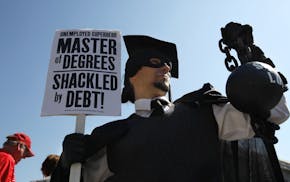During the housing boom, qualifying for a loan was as easy as drawing a breath.
Those days of easy credit are history, unless you happen to be a college student.
No income, no job, no assets? No problem! Here's $30,000. Wait; let's make it $50,000.
Don't think of it as debt. Think of it as an investment.
We're still living with the consequences of that rationale when it was used to justify ever-larger mortgages. I fear we may be headed for a similar outcome with student loans: a generation hobbled by an investment that didn't pan out the way they'd been led to believe.
For the first time in U.S. history, total student loan debt crossed the $800 billion threshold and now exceeds outstanding credit card debt. Almost two-thirds of college graduates in 2010 left school with student loan debt. In Minnesota, the average amount was more than $29,000.
How that happened is not hard to explain. More people, young and old, are pursuing postsecondary education. The cost of that education is rising faster than the rate of inflation, with some of the sharpest price increases occurring at state colleges and universities. Homes and retirement plans have fallen in value, which leaves students and their parents relying increasingly on federal and private loans. And everyone is telling them it's the smart thing to do because they are investing in themselves.
Which is true, but so is this: All this debt is being accumulated amid record-high joblessness, weak job growth, shrinking incomes and surging student loan default rates.
As the parent of a student in college and another who's applying, I'm not here to tell you college is not worth it. By almost every economic measure, college graduates do much better than those whose formal education ends with a high school diploma or its equivalent.
Let's look at the differences through the lens of one group, men ages 25 to 34. Those with a bachelor's degree or more earn an average of more than $67,000 a year, and fewer than 5 percent are unemployed. The comparable figures for a male high school graduate are an annual salary of $38,000 and an unemployment rate of 14 percent.
But increasingly, American students and their parents are paying for college with jumbo mortgages on their future. They're doing it when unemployment among college graduates 24 and younger is near or above historic levels, and when real incomes for college graduates are falling.
According to economist Michael Mandel's analysis (www.startribune.com/a800) of census data, real wages for college-educated young men ages 25 through 34 have fallen 19 percent since 2000. For women, the median real wage is down 16 percent since 2003.
That trend is more alarming when viewed in the context of student loan debt, which is rising much faster than the rate of inflation. Last year, two-thirds of college seniors graduated with average debt of $25,550, according to the Project on Student Debt. That's an increase of 44 percent since 1996 after adjusting for inflation.
Even those numbers tell only part of the story. Missing is debt incurred by students at for-profit colleges, the higher education sector with the fastest gains in enrollment -- and the highest rates of loan defaults. Nor do the numbers reflect debts incurred by young adults who fail to graduate from college.
How big a deal is that? Nationwide, half of all students who start college don't finish, meaning they get the worst of both worlds: no degree and debt that could literally follow them all the way to the grave, since student loan creditors have the right to garnish Social Security checks.
If the Occupy Wall Street movement has one defining characteristic, it's this dawning realization by college students or recent graduates that they may be facing decades' worth of loan payments. As one poster on Tumblr noted, "My husband and I will be paying off my student loan debt when the kids we can't afford to have are in college."
This debt overhang is a drag on consumer spending, and that's not good for the economy. So, President Obama last month unveiled a program that will lower the monthly payments on student loans and forgive them after 20 years, five years earlier than current law permits, as long as borrowers remain current on their payments.
This measure will help a relatively small number of borrowers. I worry that it also could have the unintended consequence of encouraging people to take on even more debt.
There is no simple solution. We can't tell a young person that a college degree is a passport to the global economy, but not provide them the ability to pay for it.
I just hope that, in the near future, the phrase "toxic assets" isn't used to describe the extinguished hopes of those who believed they were investing in a better future.
ericw@startribune.com • 612-673-1736

Wieffering: Time to get over debit card fees
For Thrivent and others, warnings were there

With billions in sales, some co-ops are big business
